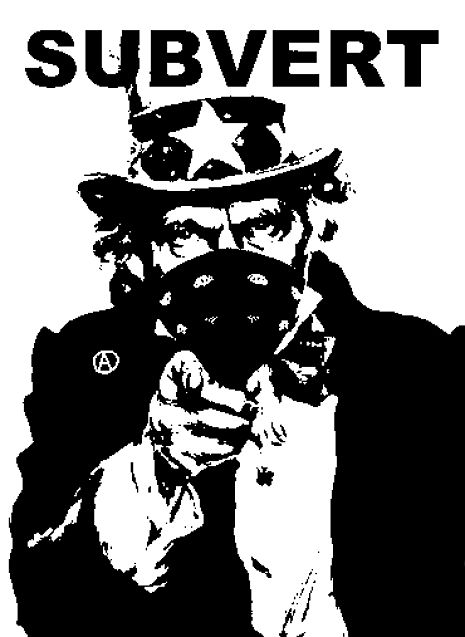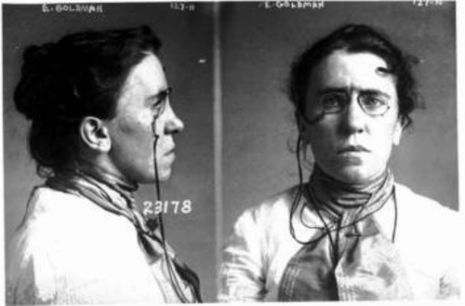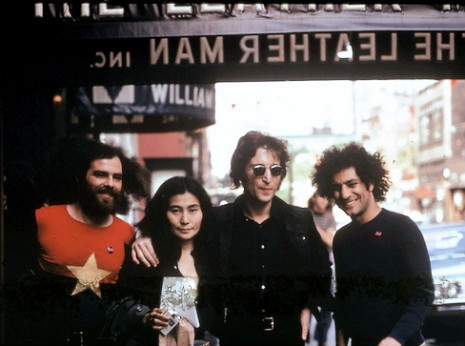
As the title promises, Steven Fischler and Joel Sucher’s Anarchism in America is a documentary survey of anarchism in the United States. The film presents an overview of the movement’s history, such as the Spanish Civil War, the 1917 Revolution, Emma Goldman, and the deaths of Sacco and Vanzetti, and takes these as the points of departure for what were then (1983) contemporary observations from the outside looking in on Ronald Reagan’s America. Whether viewed as a time capsule or as an able introduction to the various forms of anarchism, the film makes for fascinating viewing and has held up well after 31 years.
What’s perfectly obvious is how much of a libertarian or individualistic route the American strain of anarchism takes—let’s call it “free market anarchism”—in stark contrast to European-style communal living experiments (such as squatters’ groups or farm co-ops). They’re just not quite the same school of thought, although if you were to draw a Venn diagram of what they do have in common, it would be significant but also… probably equally incompatible for the things which they lack in simpatico. Does anyone in Anarchism in America have any hopes for a revolution? Seemingly not in their lifetimes. (Many of them were right, of course. I’ve read that the filmmakers are planning a sequel, so I’d suspect that post-Occupy, post-Piketty, there would be more positive prognostications to be found along those lines today.)

Emma Goldman will not attend your revolution if she can’t dance….
The film also offers anarchist or anarchist-leaning thinkers uninterrupted camera time to make their points. Like Murray Bookchin, who says this:
I had entered the communist children’s movement, an organization called the Young Pioneers of America, in 1930 in New York City; I was only nine years of age. And I’d gone through the entire ’30s as a—Stalinist—initially, and then increasingly as someone who was more and more sympathetic to Trotskyism. And by 1939, after having seen Hitler rise to power, the Austrian workers’ revolt of 1934 (an almost completely forgotten episode in labor history), the Spanish revolution, by which I mean the so-called Spanish civil war—I finally became utterly disillusioned with Stalinism, and drifted increasingly toward Trotskyism. And by 1945, I, finally, also became disillusioned with Trotskyism; and I would say, now, increasingly with Marxism and Leninism.
And I began to try to explore what were movements and ideologies, if you like, that really were liberatory, that really freed people of this hierarchical mentality, of this authoritarian outlook, of this complete assimilation by the work ethic. And I now began to turn, very consciously, toward anarchist views, because anarchism posed a question, not simply of a struggle between classes based upon economic exploitation—anarchism really was posing a much broader historical question that even goes beyond our industrial civilization—not just classes, but hierarchy—hierarchy as it exists in the family, hierarchy as it exists in the school, hierarchy as it exists in sexual relationships, hierarchy as it exists between ethnic groups. Not only class divisions, based upon economic exploitation. And it was concerned not only with economic exploitation, it was concerned with domination, domination which may not even have any economic meaning at all: the domination of women by men in which women are not economically exploited; the domination of ordinary people by bureaucrats, in which you may even have welfare, so-called socialist type of state; domination as it exists today in China, even when you’re supposed to have a classless society; domination even as it exists in Russia, where you are supposed to have a classless society, you see.
So these are the things I noted in anarchism, and increasingly I came to the conclusion that if we were to avoid—or if we are to avoid—the mistakes in over one hundred years of proletarian socialism, if we are to really achieve a liberatory movement, not simply in terms of economic questions but in terms of every aspect of life, we would have to turn to anarchism because it alone posed the problem, not merely of class domination but hierarchical domination, and it alone posed the question, not simply of economic exploitation, but exploitation in every sphere of life. And it was that growing awareness, that we had to go beyond classism into hierarchy, and beyond exploitation into domination, that led me into anarchism, and to a commitment to an anarchist outlook.
Worth noting that Bookchin left anarchism behind, too, due to what he saw as the antisocial element to American style anarchist thought.
There’s one particularly amazing piece of footage (among several included in the film) that I wanted to call to your attention. It’s the demonstration of how a policeman’s truncheon fares against various food items such as an egg, squash, and an eggplant before moving on to a Yippie’s head. That clip comes from an “answer” film made by the Yippies in the aftermath of the Chicago riots that was played on television there due to the “equal-time” rule specifies that U.S. radio and television broadcast stations must provide an equivalent opportunity to any opposing political parties who request it. When Mayor Richard Daley got to tell the city’s side of the story in something called “What Trees Did They Plant?” the Yippies got to tell their side in an extremely whacked-out short film scripted by Paul Krassner. That starts at 30:50 but if you want to see the entire thing, click over to archive.org, they’ve got it. (The guy with the truncheon is Chicago-based lefty humorist and radio broadcaster Marshall Efron, who played one of the prisoners in George Lucas’ THX 1138. He was also the voice of “Smelly Smurf” and works as a voice actor in animated films to this day.)
Toward the end of Anarchism in America, Jello Biafra and Dead Kennedys are seen onstage performing “We’ve Got a Bigger Problem Now,” while in the interview segment a level-headed young Biafra suggests that anarchy, or some sort of revolution in the USA, is probably a long, long way off. If they do make the sequel, he’s one of the first people they ought to interview for it. I’d be curious if he still feels that way. I would suspect that he’s much more optimistic these days.






